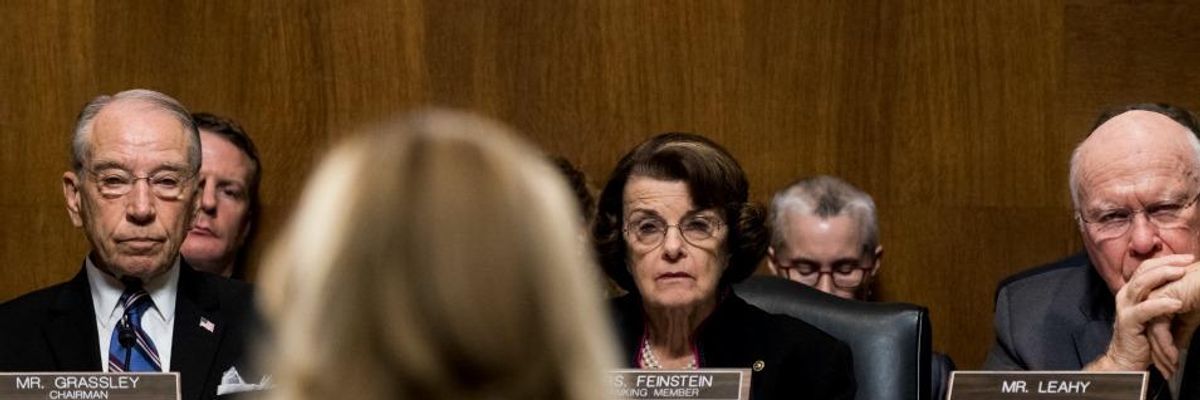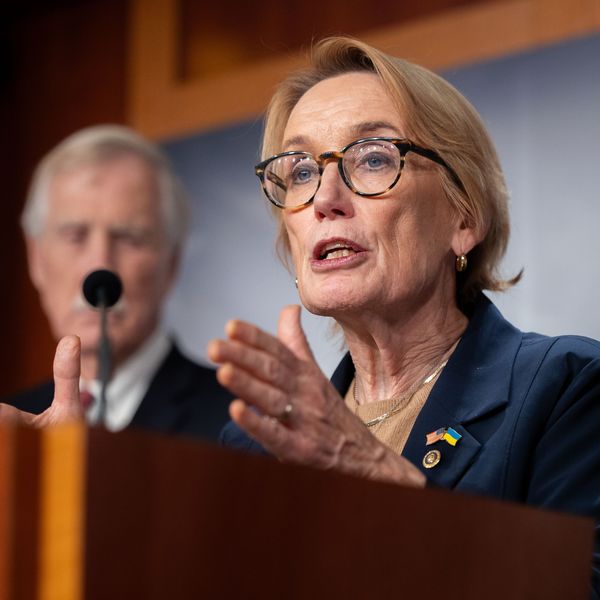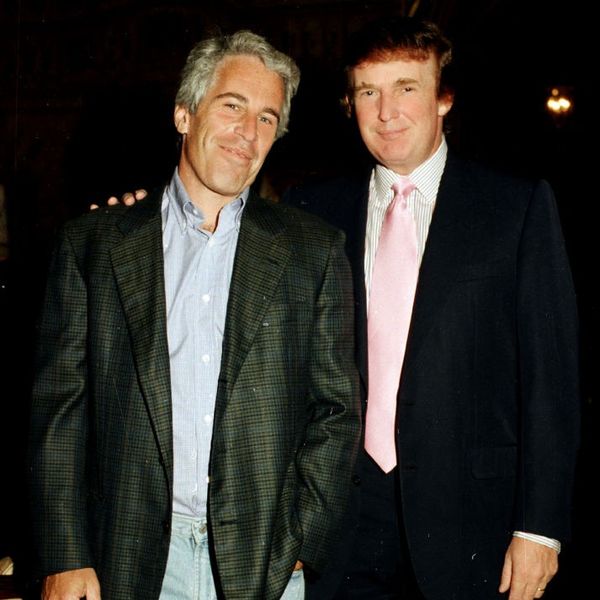
From left, Sen. Chuck Grassley, R-Iowa, Sen. Dianne Feinstein, D-Calif., and Sen. Patrick Leahy, D-Vt., listen as Dr. Christine Blasey Ford testifies during the Senate Judiciary Committee hearing on the nomination of Brett M. Kavanaugh to be an associate justice of the Supreme Court on Capitol Hill September 27, 2018 in Washington, DC. A professor at Palo Alto University and a research psychologist at the Stanford University School of Medicine, Ford has accused Supreme Court nominee Judge Brett Kavanaugh of sexually assaulting her during a party in 1982 when they were high school students in suburban Maryland. (Photo: Tom Williams-Pool/Getty Images)
By Honoring Dr. Christine Blasey Ford's Request for Privacy, Sen. Feinstein Did Exactly the Right and Moral Thing
The #MeToo movement has united millions of women—and men—to stand up for survivors. That includes honoring their privacy and standing with them, if and when they speak out.
Judge Brett Kavanaugh and some Senators have attacked Senator Dianne Feinstein, the Ranking Member of the U.S. Senate's Judiciary Committee, over her handling of a confidential letter from Dr. Christine Blasey Ford.
Senator Feinstein referred Ford's letter of July 30 to the FBI last month, after a news story attacked her for keeping the matter confidential, as the Judiciary Committee rushed forward on proceedings on the most divisive Supreme Court nominee in recent history.
That letter was from Dr. Ford who ultimately testified publicly before the Senate Judiciary Committee on September 27 that Kavanaugh assaulted her at a party, attempting to have his way with her while holding her down and covering her mouth to block her screams until she escaped from him and his buddy in high school, Mark Judge.
These are very serious charges, and Kavanaugh has categorically denied he did anything wrong.
He has also attacked Sen. Feinstein for keeping the letter confidential and for referring the matter to the FBI at the eleventh hour, though he was nominated only in July.
"Sharing a letter like this would violate a woman's right to determine when, how, and to whom to tell her story. That's her right, and her's alone, even if it involves a Supreme Court nominee."
I also believe that Sen. Feinstein was morally right to keep Dr. Ford's secret.
As the former Chief Counsel for Nominations, I am certain she did the right thing in honoring the request to keep the letter confidential.
She morally could not share the letter with the Democrats, or the Republicans, on the Committee without the permission of the author or she would be breaching that trust.
Sharing a letter like this would violate a woman's right to determine when, how, and to whom to tell her story.
That's her right, and her's alone, even if it involves a Supreme Court nominee.
For Senator Feinstein, the competing interests here must have been daunting. On the one hand, there is moral command of keeping secret a claim of attempted sexual assault by a nominee to our nation's highest court. On the other is her duty to try to protect the Court from a nominee with a demonstrated record of hostility to women's fundamental legal rights.
Should Feinstein have broken the confidentiality requested by the woman here?
Could you have kept her secret under the circumstances? And what would happen, to her and to you, if you broke her trust for the greater good? Would future whistleblowers come forward if they believed that their confidential stories would not be kept confidential?
I believe all you could really do is implore her to write a letter that could be shared with the Committee, even on a confidential basis, or to come forward and present testimony.
But it would be morally wrong to compel her to do so.
And, you would have to answer honestly any questions about the likely consequences:
Would she be attacked by some for doing so?
Yes.Would it stop Kavanaugh's confirmation?
It could, but it might not.Is there any way to testify without the key details that could identify her getting out?
Probably not.Should she come forward any way?
It's her choice alone, a choice no one else can make for her.
I know because in my career I've worked with whistleblowers. Some came forward at great personal risk. Their risks were not the same as mine, as a lawyer or reporter. Some of their stories I wish had been told to illuminate the public debate. But they're not my stories to tell.
In this case, within hours of the story breaking, the right-wing attack machine lurched forward. The leader of a group that has been funded by Koch money tweeted out an attack about how much the woman may have been drinking. That man then orchestrated a discredited scheme to try to pin the attack on a classmate of Kavanaugh's.
Another rightwing tactic that deployed almost instantly was a crowd of women defenders of Kavanaugh--even though not one of them was in the room with Kavanaugh and the woman the night of the incident that is disputed. This tactic was pioneered to defend Judge Clarence Thomas from the testimony of Anita Hill by a group of women that became the Koch-connected Independent Women's Forum, which now backs Kavanaugh.
I remember vividly Senator Hatch's scurrilous attacks on Hill, for which he has never apologized. He even demanded that she apologize to Thomas and his wife a few years ago. I also remember Senator Chuck Grassley, now the chairman, dismissing Hills' corroborators as "collaborators."
To face such men--all 11 Republicans on the Committee are men--would be daunting.
But times have changed since 1991. The #MeToo movement has united millions of women--and men--to stand up for survivors.
That includes honoring their privacy and standing with them, if and when they speak out.
And that's what Senator Feinstein did.
An Urgent Message From Our Co-Founder
Dear Common Dreams reader, The U.S. is on a fast track to authoritarianism like nothing I've ever seen. Meanwhile, corporate news outlets are utterly capitulating to Trump, twisting their coverage to avoid drawing his ire while lining up to stuff cash in his pockets. That's why I believe that Common Dreams is doing the best and most consequential reporting that we've ever done. Our small but mighty team is a progressive reporting powerhouse, covering the news every day that the corporate media never will. Our mission has always been simple: To inform. To inspire. And to ignite change for the common good. Now here's the key piece that I want all our readers to understand: None of this would be possible without your financial support. That's not just some fundraising cliche. It's the absolute and literal truth. We don't accept corporate advertising and never will. We don't have a paywall because we don't think people should be blocked from critical news based on their ability to pay. Everything we do is funded by the donations of readers like you. Will you donate now to help power the nonprofit, independent reporting of Common Dreams? Thank you for being a vital member of our community. Together, we can keep independent journalism alive when it’s needed most. - Craig Brown, Co-founder |
Judge Brett Kavanaugh and some Senators have attacked Senator Dianne Feinstein, the Ranking Member of the U.S. Senate's Judiciary Committee, over her handling of a confidential letter from Dr. Christine Blasey Ford.
Senator Feinstein referred Ford's letter of July 30 to the FBI last month, after a news story attacked her for keeping the matter confidential, as the Judiciary Committee rushed forward on proceedings on the most divisive Supreme Court nominee in recent history.
That letter was from Dr. Ford who ultimately testified publicly before the Senate Judiciary Committee on September 27 that Kavanaugh assaulted her at a party, attempting to have his way with her while holding her down and covering her mouth to block her screams until she escaped from him and his buddy in high school, Mark Judge.
These are very serious charges, and Kavanaugh has categorically denied he did anything wrong.
He has also attacked Sen. Feinstein for keeping the letter confidential and for referring the matter to the FBI at the eleventh hour, though he was nominated only in July.
"Sharing a letter like this would violate a woman's right to determine when, how, and to whom to tell her story. That's her right, and her's alone, even if it involves a Supreme Court nominee."
I also believe that Sen. Feinstein was morally right to keep Dr. Ford's secret.
As the former Chief Counsel for Nominations, I am certain she did the right thing in honoring the request to keep the letter confidential.
She morally could not share the letter with the Democrats, or the Republicans, on the Committee without the permission of the author or she would be breaching that trust.
Sharing a letter like this would violate a woman's right to determine when, how, and to whom to tell her story.
That's her right, and her's alone, even if it involves a Supreme Court nominee.
For Senator Feinstein, the competing interests here must have been daunting. On the one hand, there is moral command of keeping secret a claim of attempted sexual assault by a nominee to our nation's highest court. On the other is her duty to try to protect the Court from a nominee with a demonstrated record of hostility to women's fundamental legal rights.
Should Feinstein have broken the confidentiality requested by the woman here?
Could you have kept her secret under the circumstances? And what would happen, to her and to you, if you broke her trust for the greater good? Would future whistleblowers come forward if they believed that their confidential stories would not be kept confidential?
I believe all you could really do is implore her to write a letter that could be shared with the Committee, even on a confidential basis, or to come forward and present testimony.
But it would be morally wrong to compel her to do so.
And, you would have to answer honestly any questions about the likely consequences:
Would she be attacked by some for doing so?
Yes.Would it stop Kavanaugh's confirmation?
It could, but it might not.Is there any way to testify without the key details that could identify her getting out?
Probably not.Should she come forward any way?
It's her choice alone, a choice no one else can make for her.
I know because in my career I've worked with whistleblowers. Some came forward at great personal risk. Their risks were not the same as mine, as a lawyer or reporter. Some of their stories I wish had been told to illuminate the public debate. But they're not my stories to tell.
In this case, within hours of the story breaking, the right-wing attack machine lurched forward. The leader of a group that has been funded by Koch money tweeted out an attack about how much the woman may have been drinking. That man then orchestrated a discredited scheme to try to pin the attack on a classmate of Kavanaugh's.
Another rightwing tactic that deployed almost instantly was a crowd of women defenders of Kavanaugh--even though not one of them was in the room with Kavanaugh and the woman the night of the incident that is disputed. This tactic was pioneered to defend Judge Clarence Thomas from the testimony of Anita Hill by a group of women that became the Koch-connected Independent Women's Forum, which now backs Kavanaugh.
I remember vividly Senator Hatch's scurrilous attacks on Hill, for which he has never apologized. He even demanded that she apologize to Thomas and his wife a few years ago. I also remember Senator Chuck Grassley, now the chairman, dismissing Hills' corroborators as "collaborators."
To face such men--all 11 Republicans on the Committee are men--would be daunting.
But times have changed since 1991. The #MeToo movement has united millions of women--and men--to stand up for survivors.
That includes honoring their privacy and standing with them, if and when they speak out.
And that's what Senator Feinstein did.
Judge Brett Kavanaugh and some Senators have attacked Senator Dianne Feinstein, the Ranking Member of the U.S. Senate's Judiciary Committee, over her handling of a confidential letter from Dr. Christine Blasey Ford.
Senator Feinstein referred Ford's letter of July 30 to the FBI last month, after a news story attacked her for keeping the matter confidential, as the Judiciary Committee rushed forward on proceedings on the most divisive Supreme Court nominee in recent history.
That letter was from Dr. Ford who ultimately testified publicly before the Senate Judiciary Committee on September 27 that Kavanaugh assaulted her at a party, attempting to have his way with her while holding her down and covering her mouth to block her screams until she escaped from him and his buddy in high school, Mark Judge.
These are very serious charges, and Kavanaugh has categorically denied he did anything wrong.
He has also attacked Sen. Feinstein for keeping the letter confidential and for referring the matter to the FBI at the eleventh hour, though he was nominated only in July.
"Sharing a letter like this would violate a woman's right to determine when, how, and to whom to tell her story. That's her right, and her's alone, even if it involves a Supreme Court nominee."
I also believe that Sen. Feinstein was morally right to keep Dr. Ford's secret.
As the former Chief Counsel for Nominations, I am certain she did the right thing in honoring the request to keep the letter confidential.
She morally could not share the letter with the Democrats, or the Republicans, on the Committee without the permission of the author or she would be breaching that trust.
Sharing a letter like this would violate a woman's right to determine when, how, and to whom to tell her story.
That's her right, and her's alone, even if it involves a Supreme Court nominee.
For Senator Feinstein, the competing interests here must have been daunting. On the one hand, there is moral command of keeping secret a claim of attempted sexual assault by a nominee to our nation's highest court. On the other is her duty to try to protect the Court from a nominee with a demonstrated record of hostility to women's fundamental legal rights.
Should Feinstein have broken the confidentiality requested by the woman here?
Could you have kept her secret under the circumstances? And what would happen, to her and to you, if you broke her trust for the greater good? Would future whistleblowers come forward if they believed that their confidential stories would not be kept confidential?
I believe all you could really do is implore her to write a letter that could be shared with the Committee, even on a confidential basis, or to come forward and present testimony.
But it would be morally wrong to compel her to do so.
And, you would have to answer honestly any questions about the likely consequences:
Would she be attacked by some for doing so?
Yes.Would it stop Kavanaugh's confirmation?
It could, but it might not.Is there any way to testify without the key details that could identify her getting out?
Probably not.Should she come forward any way?
It's her choice alone, a choice no one else can make for her.
I know because in my career I've worked with whistleblowers. Some came forward at great personal risk. Their risks were not the same as mine, as a lawyer or reporter. Some of their stories I wish had been told to illuminate the public debate. But they're not my stories to tell.
In this case, within hours of the story breaking, the right-wing attack machine lurched forward. The leader of a group that has been funded by Koch money tweeted out an attack about how much the woman may have been drinking. That man then orchestrated a discredited scheme to try to pin the attack on a classmate of Kavanaugh's.
Another rightwing tactic that deployed almost instantly was a crowd of women defenders of Kavanaugh--even though not one of them was in the room with Kavanaugh and the woman the night of the incident that is disputed. This tactic was pioneered to defend Judge Clarence Thomas from the testimony of Anita Hill by a group of women that became the Koch-connected Independent Women's Forum, which now backs Kavanaugh.
I remember vividly Senator Hatch's scurrilous attacks on Hill, for which he has never apologized. He even demanded that she apologize to Thomas and his wife a few years ago. I also remember Senator Chuck Grassley, now the chairman, dismissing Hills' corroborators as "collaborators."
To face such men--all 11 Republicans on the Committee are men--would be daunting.
But times have changed since 1991. The #MeToo movement has united millions of women--and men--to stand up for survivors.
That includes honoring their privacy and standing with them, if and when they speak out.
And that's what Senator Feinstein did.

